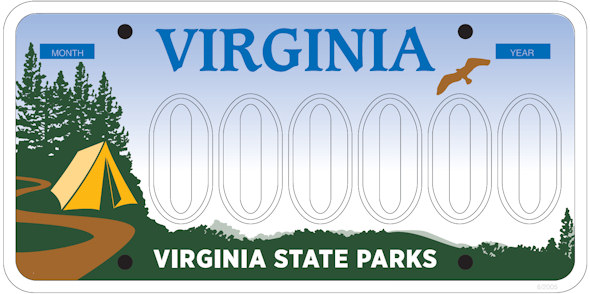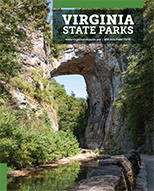Open fires are prohibited throughout the park from midnight to 4 p.m., Feb. 15 through April 30. Learn more.
Winter hiking and wildlife at Virginia State Parks

Hiking at Virginia State Parks is a great year-round activity, but winter hiking presents challenges that warmer weather rambling does not. More preparation and precautions are necessary as the days grow colder and shorter. Knowing how to layer appropriately and bringing along the appropriate gear are crucial.
That said, winter hiking often provides new sights and experiences. Bare trees reveal landscapes previously unseen, wintering birds are busy foraging for food, and animal tracks are more evident in fresh snow.
If you can stand the cold—there’s plenty of magic to be found.
From the shores of the Atlantic and across the Chesapeake Bay, through the Appalachians and beyond the Blue Ridge, we have a trail for you.
Wintertime hiking does offer some challenges that require some preparation and precautions that are not considered during warmer months.
The most critical of these is the air temperature. Staying warm is the main priority as hypothermia (lowering of your body temperature) and frostbite are real dangers. Ice and hard-packed snow can pose a safety hazard as well. Being alert and thinking ahead will allow you to enjoy a hike during this unique time of the year.
- Check the weather – Storms along the sea can be just as hazardous as snow in the mountains. Stay home when the weather is dangerous or there are "weather advisories."
- Take safety gear –Having proper shoes, sunscreen and a hat is always a good idea, but winter demands even more. We strongly recommend you carry a whistle and a light in the event you get lost or need to signal for help. Leaving behind a plan with someone indicating where you are going and what time you expect to return is also a must. If the ranger station is open, let them know of your plans, too.
- Know your limitations – If you are inexperienced hiking in snowy, cold conditions, go with someone who is. Even when hiking during good conditions, hiking with a friend is a nice safety measure.
- Stay alert for signs of cold or exhaustion in yourself or your hiking partners. Never be afraid to cut the hike short if need be.
- Avoid late afternoon hikes - The hike back may be longer than you anticipated, and the temperatures drop dramatically after sun-down.
- Wear the right clothes – Protect your body. Wear a warm hat, gloves (mittens are a better option) and take an extra layer for your torso. Cotton might be comfortable, but it holds on to water and is not a good next-to-skin option. Wool or synthetics are a better choice. Windproof/waterproof outerwear and boots is also a must—even if you don’t wear it, carry it with you.
- Avoid sitting on bare rock or metal – Avoid heat loss from sitting on surfaces colder than your body (conduction). Bring along a closed cell foam pad or sit on your pack if you stop to take a break.
- Watch your step – Step on bare ground and exposed rocks. Don’t step on icy or hard packed snow surfaces. Traction devices like micro spikes might also be a good idea depending on conditions. Be mindful of hiking with dogs as well; a pull from a dog at the wrong moment can cause a fall even in good conditions. If you do hike with a dog, make sure it has all the weather protection it needs.
- Avoid walking on frozen lakes and streams - Ice may look solid and tempting, but it can be dangerously thin. Stay off to prevent accidents, and make sure children and pets are kept away too.
- Eat high energy snacks and drink water – Your body will be working in overdrive to keep you warm, so you have to fuel up. High fat/calorie foods are great for keeping you warm in cold weather. Drink plenty of water and avoid dehydration.
Camping and backpacking
Virginia State Parks have hike-in primitive camping available during the winter.
Learn More about Winter Camping
- Learn more about state park campgrounds and reservation policies.
Winter Wildlife

During winter migration, Back Bay National Wildlife Refuge and False Cape State Park are a bird-watchers dream. Many species of swans, geese and ducks can be seen from November to March.
Read more about Winter Wildlife Adventures.
Read about Wintering Waterfowl at False Cape.
Read about Reasons to go Winter Birding at Mason Neck State Park.
Recent blogs about Hiking
Order your Virginia State Parks
license plate













